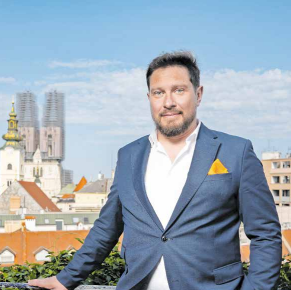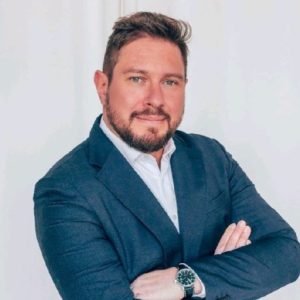
Croatian Version here: Article
English Translation
Croatia Has a Vital IT Sector and Visionaries in Agri-Tech
Matija Kontrec, Vice President for Investment Analytics, Risk, and Compliance at Arclif Group, recently participated in the prestigious Zagreb Road Show. During this event, Arclif Group presented its vision of Croatia’s potential to become a regional investment center, with the first concrete initiatives and collaborations with local businesses. We spoke with Kontrec about the conclusions of the Road Show, real examples of cooperation, and plans for opening an office in Zagreb.
What are the key conclusions and results of the Zagreb Road Show? Have concrete contacts already been established or collaborations agreed upon with Croatian companies?
Croatia has the potential to become a regional investment hub. The meetings we held were very positive and constructive. We initiated a number of concrete ideas for cooperation with several Croatian companies.
Which Croatian companies showed potential for partnership with Arclif Group? Which sectors were most represented among the interested companies?
We had contact with eight companies from various sectors, including IT and technology, the food sector, and real estate. The common denominator of all meetings was enthusiasm, as well as strategic thinking and long-term planning within these companies and industries.
How would you assess the readiness of Croatian entrepreneurs for internationalization and attracting foreign investment? What are the main advantages and challenges you observed?
Internationalization is a key next step in the development of Croatian companies. All the entrepreneurs we spoke with are well aware of this and are ready for it. From this perspective, we at Arclif Group arrived at the right time and place. With our experience from 85 successful transactions and access to capital, we are able to support Croatian companies in every segment of this vital leap.
You mentioned the possibility of opening an office in Zagreb. What are the next steps in this direction and what would it mean for the Croatian market?
We have a concrete idea and opportunities for opening an office in Zagreb. Now we need to evaluate the resonance of our visit. Certainly, cooperation will be easier and processes shorter with a permanent office in Zagreb.
What role did the Croatian Embassy in Germany play in organizing and ensuring the success of this event? Are there plans for further institutional cooperation?
His Excellency, Ambassador of Croatia to Germany, Gordan Bakota, and his team proved to be the pillars of our arrival in Zagreb. Not only did they connect us with vital companies in Croatia, but they also enabled us to meet with State Secretary Zdenko Lucić, who was extremely cordial and constructive. Mr. Lucić impressed us with his expertise, approachability, and the way he represented Croatia and its economy. The engagement we experienced from Gordan Bakota and Kristijan Tušek, the Croatian Consul in Hamburg, can serve as an example of future-oriented economic diplomacy. I would also like to highlight the excellent meeting with Tim Pleyer, Director of the Croatian-German Chamber of Commerce, and Melita Maganić, Head of the Member Relations Team at the German-Croatian Chamber of Commerce, who is a central multiplier of economic relations between the two countries.
As CEO of ARC Advisory Partners and Vice President of Arclif Group, how do you define your group’s strategic focus? What are the key differences between your three business pillars: industrial, services, and investment?
Our focus is to recognize what specifically distinguishes individual companies from comparable firms. We operate by the principle “We invest in top entrepreneurs and top products.” As investors, we are independent and open to all industries. It is also very important to us who leads the company and what kind of team surrounds them. Depending on goals and needs, we can act as investors, intermediaries, or consultants through our subsidiaries. Our business model is based on three pillars. The first is Industrial, where we actively invest in and build companies, as we did with MEV Cars or Norge Mining. The second is Services—these are our consulting subsidiaries offering financing services, M&A advisory, cost optimization, and patent law. And finally, Investments—through which we buy and hold stakes until exit without active involvement in development, as we did with Facebook and Spotify.
How does ARC Advisory Partners support small and medium-sized enterprises in their growth and internationalization? Can you provide concrete examples of successful projects?
Arclif Group is known as an accelerator. Already in 2012, we invested in electric cars by acquiring a company that at the time was little more than a license and an idea on paper. By the time we exited in 2023, we had sold over 4,500 vehicles with exports to the UAE, Qatar, Greece, the USA, and the UK. We negotiated car production with the highest state officials in Greece and Turkey.
Given your experience in investment management in Germany, how do you plan to transfer that knowledge and practices to the markets of Southeast Europe, especially Croatia?
One of our central insights is that knowledge transfer is no longer a one-way street. In the meantime, German companies also have a lot to learn from Croatian companies.
Arclif Group has experience in more than 85 successfully completed transactions. What are the most important factors contributing to the success of these transactions?
The most important factor for success is project selection. We receive about 800–900 investment inquiries annually, of which we realize only a few. We spend a lot of time getting to know the people responsible for the projects, because ultimately they are the ones who build the projects and companies. We are the ones who decide where the funds go.
How do you see the role of Arclif Group in fostering innovation and technological development within your portfolio companies?
The management of Arclif Group has a combined experience of about a hundred years in industry and banking. With our knowledge, market insights, and network, we are able to recognize trends and developments early, as we did in 2012 by foreseeing the future in electric vehicles.
You mentioned that Croatia is one of the fastest-growing economies in Europe. What specific indicators or reforms convinced you of this?
Over the past five years, the key contributors to Croatia’s economic development have been strategic decisions such as the introduction of the euro, joining the Schengen Area, and strong absorption of EU funds. Along with fiscal stability and encouragement of digital transition, Croatia has become an increasingly attractive destination for foreign investment. Particularly notable is the new focus on nearshoring and strengthening economic diplomacy, which is positioning Croatia ever more clearly as a regional investment center.
How do you assess the impact of current geopolitical challenges, such as the war in Ukraine and trade tensions between the EU and the USA, on the investment environment in Europe?
We are shaken by war, war suffering, and human tragedy. These human tragedies and losses cannot be replaced by anything. We are aware of this, as Croatia has also experienced war trauma.
“Europe invests too little in startups and venture capital. For example, after the Lehman Brothers crisis, General Motors invested $500 million in the then-unknown Uber, while at the same time Daimler Benz invested only about €15 million in Lyft, which was supposed to be the European version of Uber…”
We live in times of economic uncertainty caused by these geopolitical developments. As investors, we simply have to live with this and accept it as reality, which does not mean it deters us from investing, but rather that we must take this additional risk into account.
Generally speaking, Europe has invested too little in recent years—especially in startups and venture capital. For example, after the Lehman Brothers crisis and the return of state guarantees, General Motors invested $500 million in a then-unknown company, Uber. At the same time, Daimler Benz, which had a net profit of €13 billion, invested only about €15 million in Lyft, which was supposed to be the European version of Uber. That is why, in our opinion, Europe is lagging behind America and the rest of the world today. Europe needs a new investment culture and a willingness to take risks. Venture capital today must be allocated on a large scale, not in homeopathic doses as before, if Europe wants to keep pace with the rest of the world.
In the context of near-shoring, how attractive is Croatia as a destination for German and international companies seeking alternative production locations?
Croatia has a whole range of factors that make it an extremely attractive destination for near-shoring. First, there is geography—products from Croatia can be quickly delivered to key countries in Europe. Austria and Germany are nearby, Italy is a neighbor, as are Hungary and Slovakia. Turkey and Poland are within two days’ truck drive. This is complemented by excellent infrastructure in Croatia, especially road and port infrastructure. Investments in railway infrastructure indicate that all key players in Croatia have recognized this advantage and are working on it. At the same time, Croatia has an excellent education system, producing many highly qualified young people every year—a big plus. Croatia has also proven to be a politically stable and responsible country, with far-reaching fiscal and energy policies. This reliability makes it extremely attractive.
Finally, through its diaspora and digital nomads, Croatia has a large reserve of human capital.
What role can they play in strengthening the domestic economy and attracting foreign investment?
Both the diaspora and digital nomads are familiar with the culture and economic opportunities of both Croatia and the home countries of companies. As such, they are able to be vital in bringing Croatia closer to foreign companies. Any manager will more readily decide to open a plant in a country where they know there are enough people who speak their language and understand their mentality.
Which sectors of the Croatian economy do you consider most promising for foreign investors in the next five years?
Croatia has a vital IT sector and is increasingly turning to technology and services in that sector. We also consider the agriculture sector to be extremely promising. We had excellent contact with several visionary entrepreneurs in the agri-tech field who have considerable know-how and far-reaching plans for revitalizing regions in Croatia. The combination of agriculture and technology could be one of the key sectors of the Croatian economy in the coming years.

